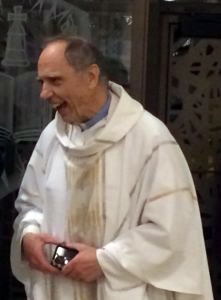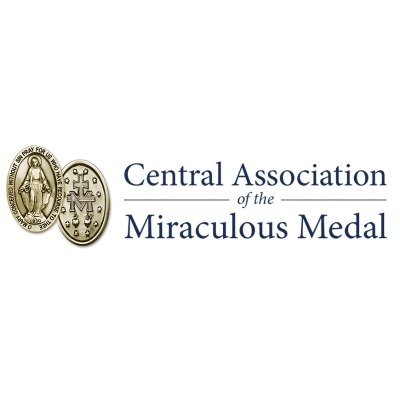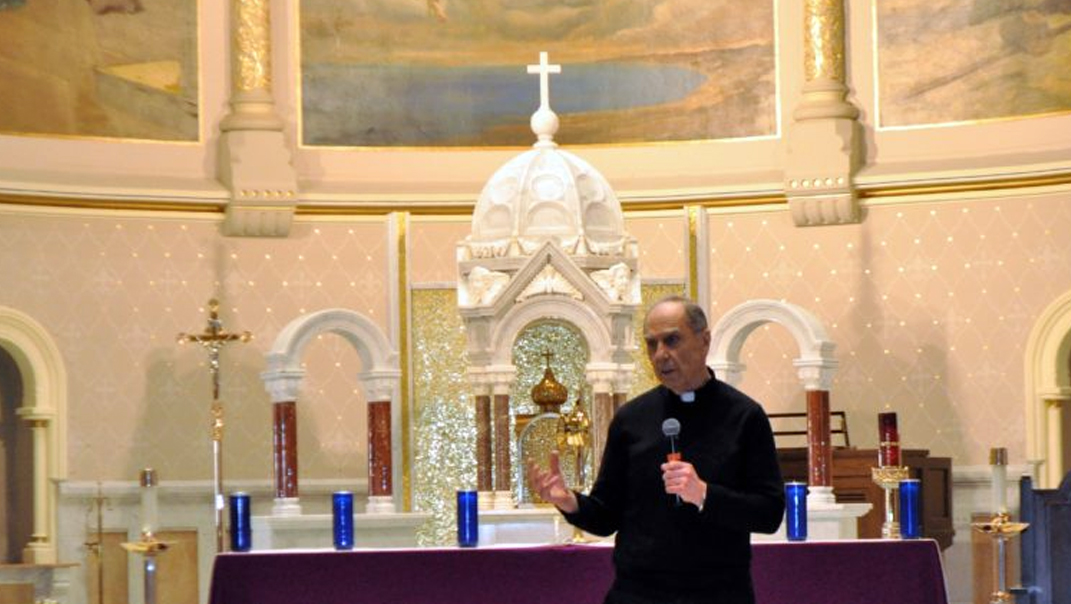Fr. Shea Celebrates 50 Years
In celebration of his 50 years as a Vincentian Priest, we spoke with Fr. Michael Shea, CM, Associate Director of the Miraculous Medal Shrine, about being Catholic, his childhood, favorite saint, and baseball.
You’ve been giving homilies and retreats for five decades, sharing the Good News with the world. What one piece of advice would you give to lay people about communicating the Gospel to people in their own lives?
On May 30 of this year, I celebrated the 50th anniversary of my ordination to the priesthood. On that day I received an e-mail from Fr. Tom McKenna, CM, one of my classmates that simply stated, “Happy 50th Mike.” I e-mailed back, “Thank you, Tom, and congratulations to you. I remember our ordination day well and on occasion reflect on the seven of us standing around the altar with Bishop O’Shea, being ordained and celebrating our first Mass together.During the fifty years as an ordained priest I served thirteen years in high school ministry, twelve years in higher education, fifteen years as the director of a retreat house and ten years as an associate director at Mary’s Miraculous Shrine in Philadelphia.
During those 50 years, by the grace of God, I did my best to share the Good News of Jesus with others. At times it was not always evident how that could be accomplished. On those occasions I would direct my attention to the Holy Spirit in prayer and raise the question, “In this situation what would Jesus do?” Inevitably it would become clear not only what Jesus would do, but also what Jesus expected me to do. Then, by the grace of God, I would do my best to do the Lord’s will.
The fact of the matter is that as baptized Christians we are all called to bring Christ’s Good News to others. There have been, are, and will continue to be situations at home, school, work, in the neighborhood, in our country and in our world when Christians, whether ordained or lay, are called upon to be conduits of Jesus’ love and concern to others. At times it will not always be evident how this can be accomplished. When that is the case the one piece of advice that I would offer to lay people is to turn to the Holy Spirit in prayer and raise the question, “In this situation what would Jesus do?” I assure you it will soon become clear not only what Jesus would do but also what Jesus expects you to do. Then, by the grace of God, do your best to do the Lord’s will.
When you speak with young adults, vowed and laity alike, what gives you the most hope for the future?
Throughout my 50 years of priesthood I have enjoyed a decent amount of contact with young adults. My overall experience has been that young adults have a heart for serving others. It has never been difficult to gather a number of young adults together who were willing to sacrifice their time, comfort, convenience, and their money to participate in a mission trip to places like Mississippi after hurricane Katrina or Juarez, Mexico. On these trips the young adults work together, pray together, interact with the host families, live very simply … and in the process they inevitably experience a conversion of mind and heart. It always amazes me when we return home after two weeks of challenging physical work and a long bus trip to see how these young adults would get off the bus and then-and-there sign up for the next mission trip. Their eagerness and willingness to serve the needs of others fills my mind and heart with hope for the future.
When you were a child, who was your favorite saint and why?
I have always had a great admiration for St. Joseph. Actually I do not know a great deal about him … but what I do know, I admire. To me St. Joseph was, after Christ, the summit “man-for-others”. He was for God. He was for Mary. He was for Jesus. He was a behind the scenes kind of worker. He did what needed to be done even when he received little or no recognition for the sacrifices the task required. However, that did not bother St. Joseph because he was a “job-well-done is its own reward” kind of person.
When I think of St. Joseph, I frequently see my father. If you knew my dad for any length of time, you would know that as a husband and father my dad was a man-for-others. For him, God was number one … his wife number two … his children number three … and in his own mind he was number four. Because of the selfless way that my father lived, we had a roof over our heads, food on our table, clothes on our backs, and a good home life … and what, besides the love and admiration that we all had for our father, was in it for my dad? I believe Jesus answered that question for him when the Lord called my father from this life.
I feel blessed that my life has been influenced both by St. Joseph and my father. I believe that the more I can become a “job-well-done is its own reward” kind of person as they were, the more I will be able to bring the Good News of Jesus to others.
If you could have dinner with one non-religious historical figure (dead or alive), who would it be and why? What might you ask them?
I would have loved to have had dinner and conversation with Gil Hodges. Gil Hodges was an outstanding athlete. He played first base for the Brooklyn Dodgers all throughout the nineteen fifties and managed the New York Mets in the nineteen sixties, including 1969, when the New York Mets won the World Series. During dinner I would have loved to have heard Gil Hodges talk about his playing and managing days: … playing in Brooklyn … playing against the New York Giants during the regular season … playing against the New York Yankees in a number of World Series … and playing when Jackie Robinson broke baseball’s Color Line. It would have been great to hear Gil Hodges’ emotional reactions to winning the World Series as a player for the Brooklyn Dodgers in 1955 and then as a manager for the New York Mets in 1969.
On a more somber note it would also have been interesting to hear how Gil Hodges weathered the storm when Bobby Thompson hit that dramatic three run home run in the bottom of the ninth inning which defeated the Dodgers 5-4 and projected the Giants into the 1951 World Series. (I would have personally asked the question whether he believed that the Giants stole the sign for that pitch or not). However, for me, it would have been most interesting to hear Gil Hodges share his emotional reaction to the Dodgers moving from Brooklyn to Los Angeles 1958.
Gil Hodges was also an outstanding person. He was a practicing Catholic, a loving husband, a good father, and a faithful friend. When the Hall of Famer Ralph Kiner was asked about Gil Hodges, he said, “Gil Hodges epitomized what life is all about. He was sturdy. He was honest. He was hard working. He was the kind of person you would always want to have as a friend … and friends for Gil Hodges were not just casual acquaintances, but they were individuals with whom he shared a personal and deep communion.” When Jackie Robinson heard of Gil’s death, he said, “I feel today the way I felt when my son died.” For me as a Catholic it would have been very interesting to hear from Gil Hodges himself on how his Catholic faith influenced his life as a husband, father, and friend.
Gil Hodges was a great baseball player and a quality person. So for many-a-fan who grew up in Brooklyn in the 1950s and loved baseball, having dinner and an extended conversation with Gil Hodges would have been the fulfillment of a dream come true.
 You are a New York Mets fan who is living in Philadelphia. How do you manage that? Do you get a lot of grief from Phillies fans?
You are a New York Mets fan who is living in Philadelphia. How do you manage that? Do you get a lot of grief from Phillies fans?
I was born and raised in Brooklyn New York. I grew up there as an avid Brooklyn Dodger fan. The Dodgers played their home games in Flatbush at Ebbets Field, their games were televised over WORTV channel 9, and sponsored by Schaefer beer. When you were looking at the game on TV, when you heard, “Schaefer Beer presents Brooklyn Dodger Baseball,” you knew that the game was about to begin. In 1958 the Brooklyn Dodgers broke the hearts of their fans when they moved from Brooklyn, New York, to Los Angeles, California.
The New York Mets arrived in Astoria, Queens in 1962. Their first home field was the Polo Grounds where the New York Giants played their home games before they moved to San Francisco. After the Polo Grounds the Mets played their games at Shea Stadium before moving to City Field where they currently play.
In my fifty years of priesthood I have been stationed in Philadelphia, Niagara Falls, New York, Auburn, Alabama, and Spring Lake, Michigan. I arrived at each location as a total stranger. I knew nobody and nobody knew me. If I waited for the natural process to establish social, personal, and ministerial ties, it would have taken the better part of a year. However, in moving from place to place I soon discovered an effective ice breaker which accelerated the process. All I had to say was something like, “Let’s Go Mets” or “Let’s Go Giants!” or “How about those New York Rangers or Knicks.” Whenever I made such proclamations, conversations, bonding and ministry followed. In making those bold proclamations, no hostility was ever intended or taken … it all led to conversations about baseball, football, hockey, basketball, and beyond.
Actually I experienced a number of benefits for declaring my allegiance for New York teams. I have been given a number of New York Mets hats, shirts, and trinkets. Recently a man, who I got to know when he was a student at St. Thomas More High School in West Philadelphia, gave me a New York Giant casual dress shirt. His son is a football coach at a Division I school. New York Giant scouts visit various college campuses seeking the names of up and coming players at that school. They gift the college coaches with these very nice dress shirts. My friend’s son, a Philadelphia Eagle fan, received one of these shirts … he showed it to his father and wondered what he could do with it. His father said, “Give it to me … I’ll give it to Fr. Shea … he’ll wear it and love it.” And I do.
There were also some humorous moments. One weekend I was promoting devotion the Mary through the Miraculous Medal in a Philadelphia parish. Before getting into the homily, invariably I let the people know that despite the fact that I spent more than twenty years ministering here in Philadelphia, I was born and raised in Brooklyn, New York, and consequently I am a New York Met fan. After Mass while people were exiting the church, one of the parishioners approached me and said, “Father, as soon as you said that you were a Met fan, I knew that you did not come to our parish for fund raising.”
So living in Philadelphia and openly professing that I am a Met fan has been a rewarding experience for me. However, I doubt that the same would be true if anyone openly claimed here in Philadelphia that he was a Dallas Cowboy fan!


